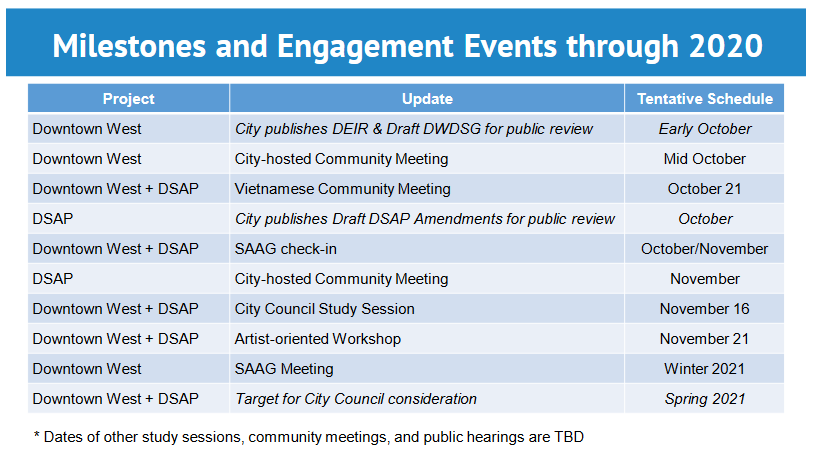Welcome to SV@Home’s Policy Rundown, your need-to-know overview of important housing policy actions and developments from the past two weeks.
San José Diridon: SAAG Receives Updates on Timeline, Heights, and Housing
Last night, the Diridon Station Area Advisory Group (SAAG) received updates from San José city staff on the Diridon Station Area (DSAP)’s planning process timeline, proposed changes to height limits in certain parts of the Station Area, and a preview of the City’s Affordable Housing Implementation Plan.
The staff presentation, available here, includes all of the presented information. The updated community engagement and Council decision calendar is here:

SV@Home looks forward to the release of further details on the Downtown West and DSAP Draft EIRs in October. We remain adamant that the City should not be considering height reductions that will limit potential housing production, especially in the southern part of the Plan Area, which has the highest possible allowed heights and is targeted for the greatest residential development. The investments being made in the Diridon Station Area must benefit all of San José, and at this stage in the process we must not limit any opportunities for much-needed housing and affordable housing production. You can review SV@Home’s Housing Vision here.
We are also looking forward to the release of more information about the City’s Affordable Housing Implementation Plan next month. Staff’s presentation last night previewed a comprehensive approach incorporating all 3Ps (production, preservation, and protection) as well as some innovative proposals to address affordability issues, including targeting Commercial Linkage Fee funds and creating a preservation fund to make existing naturally-occurring affordable housing permanent.

Mountain View and Palo Alto Expand Safe Parking Programs
In the last two weeks, Mountain View and Palo Alto took action to expand or establish Safe Parking programs for people living in their vehicles. Last week, the Mountain View City Council allocated additional funding to add 25 new spaces to the city’s existing lots, bringing the total available spaces to 76. And earlier this week, their neighbor to the north launched their own pilot program, with the Palo Alto City Council voting to create 12 new spaces in a parking lot just off the Baylands. The programs, both administered by the nonprofit organization Move Mountain View, provide wrap-around services including sanitation, case management, access to food pantry assistance, and COVID-19 testing.
SV@Home thanks both Mountain View and Palo Alto for taking these actions to provide help to some of the most vulnerable members of our community. Unfortunately, we know that despite these efforts, there remain hundreds of families and individuals living in RVs or other vehicles on city streets across the County. We continue to support County-level action to coordinate more opportunities for emergency safe parking assistance. At the end of the day, the only sustainable path forward is to ensure that we create permanent housing opportunities for these families and individuals.
These decisions are also related to a major ballot measure in Mountain View, Measure C, which is asking residents to weigh in on a proposed large vehicle parking ban on the majority of city streets. The Mountain View City Council initially passed an ordinance banning the parking of RVs and other large vehicles on certain city streets in October 2019, which set off a signature gathering campaign that resulted in the issue going to the ballot. A “Yes” vote is in support of the ban while a “No” vote opposes the ban. Housing justice organizations have argued that banning RV parking will simply result in displacement of vulnerable families, and the City must instead focus on further expanding Safe Parking to accommodate all of those in need. More information is available on the City of Mountain View’s Election webpage.

Anti-Displacement Study Sessions Next Week in San José and Mountain View
Next week on Tuesday, San José and Mountain View will both hold study sessions on staff proposals for comprehensive anti-displacement policies.
The San José City Council will consider a proposal to adopt a number of anti-displacement efforts, which have been designed to address the gaps in local response to the housing crisis by adding to existing tools the city has in place. The proposed policy embraces the “3Ps” framework and includes new tenant protections, new policies to facilitate the preservation of existing housing resources, and a number of efforts to facilitate long-term solutions through increased affordable housing production. The effort is important because it acknowledges that the challenge of responding to displacement requires both a comprehensive assessment of local needs and a multipronged approach to solutions.
This policy is the result of a multiyear process, which included extensive community outreach and engagement. SV@Home was pleased to have been included at various points throughout this process, and we are looking forward to moving ahead with solutions.
Similarly, the Mountain View City Council will discuss a draft Comprehensive Anti-Displacement Policy, which we expect will include a number of different elements designed to work together to help keep Mountain View families securely housed. An important component of the discussion will be how the City might pursue funding for some of the proposed policy solutions. In its last goal-setting exercise, the City Council made implementing an anti-displacement strategy a top priority. In June, the Council took the first concrete action as part of this process, strengthening the City’s Tenant Relocation Assistance Ordinance (TRAO). While the latest staff report has not yet been released, you can find more information about the City’s development of these policies on the Mountain View website.
SV@Home has strongly supported the City’s efforts in this area, and believes that the most effective approach will be one that integrates a number of policy solutions that protect vulnerable tenants, preserve existing affordable homes, and incentivize the production of more permanent affordable housing.
